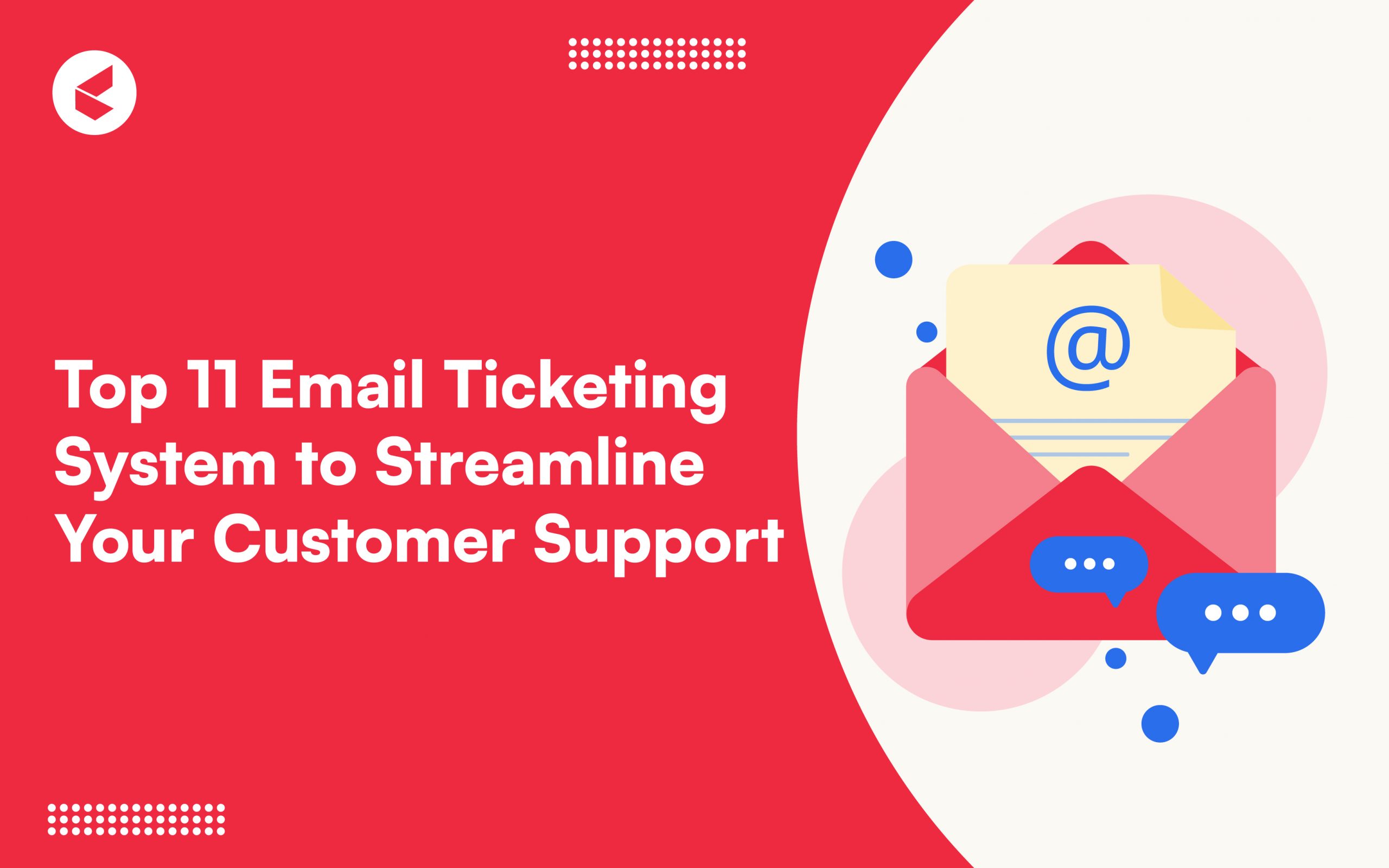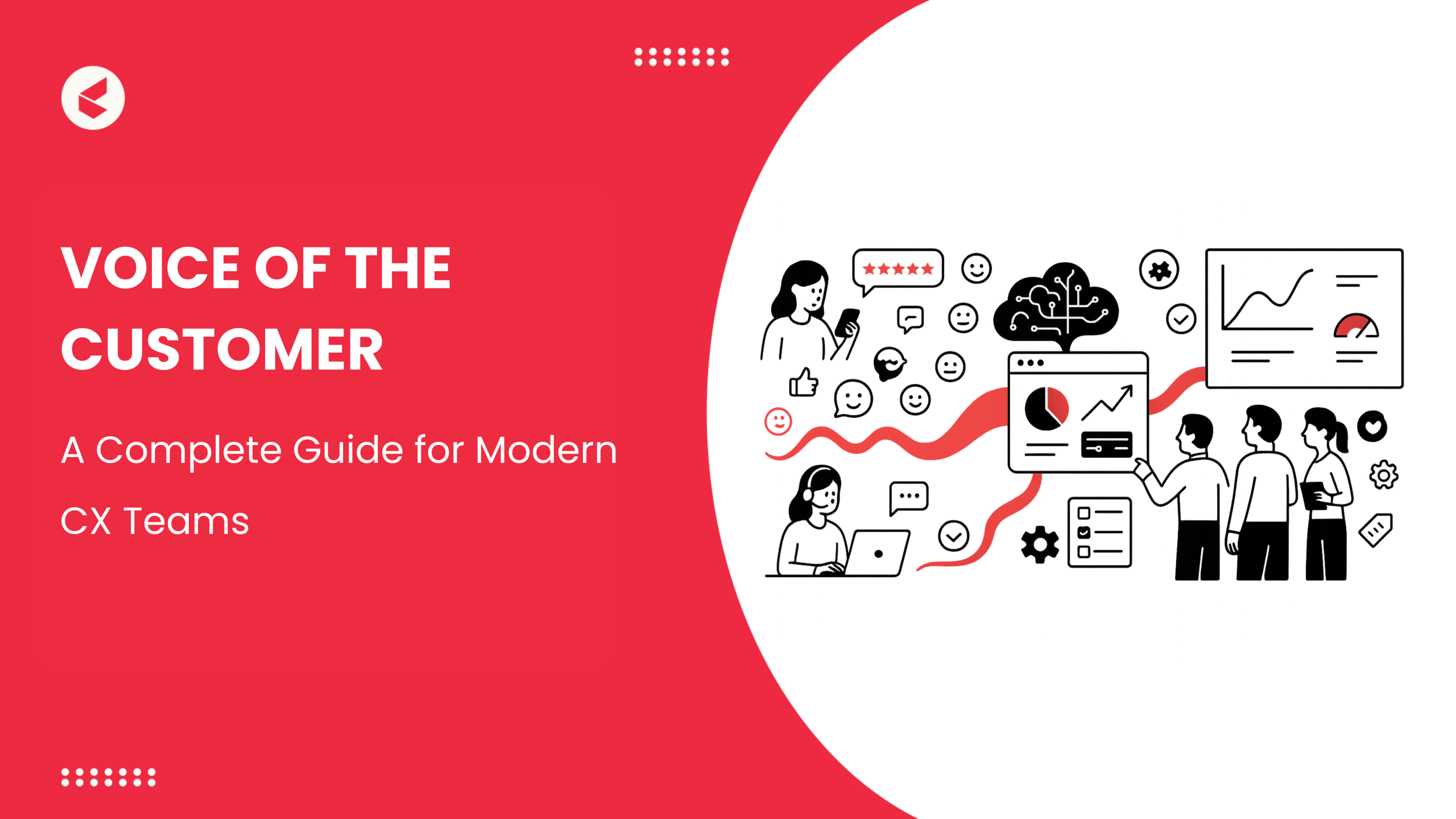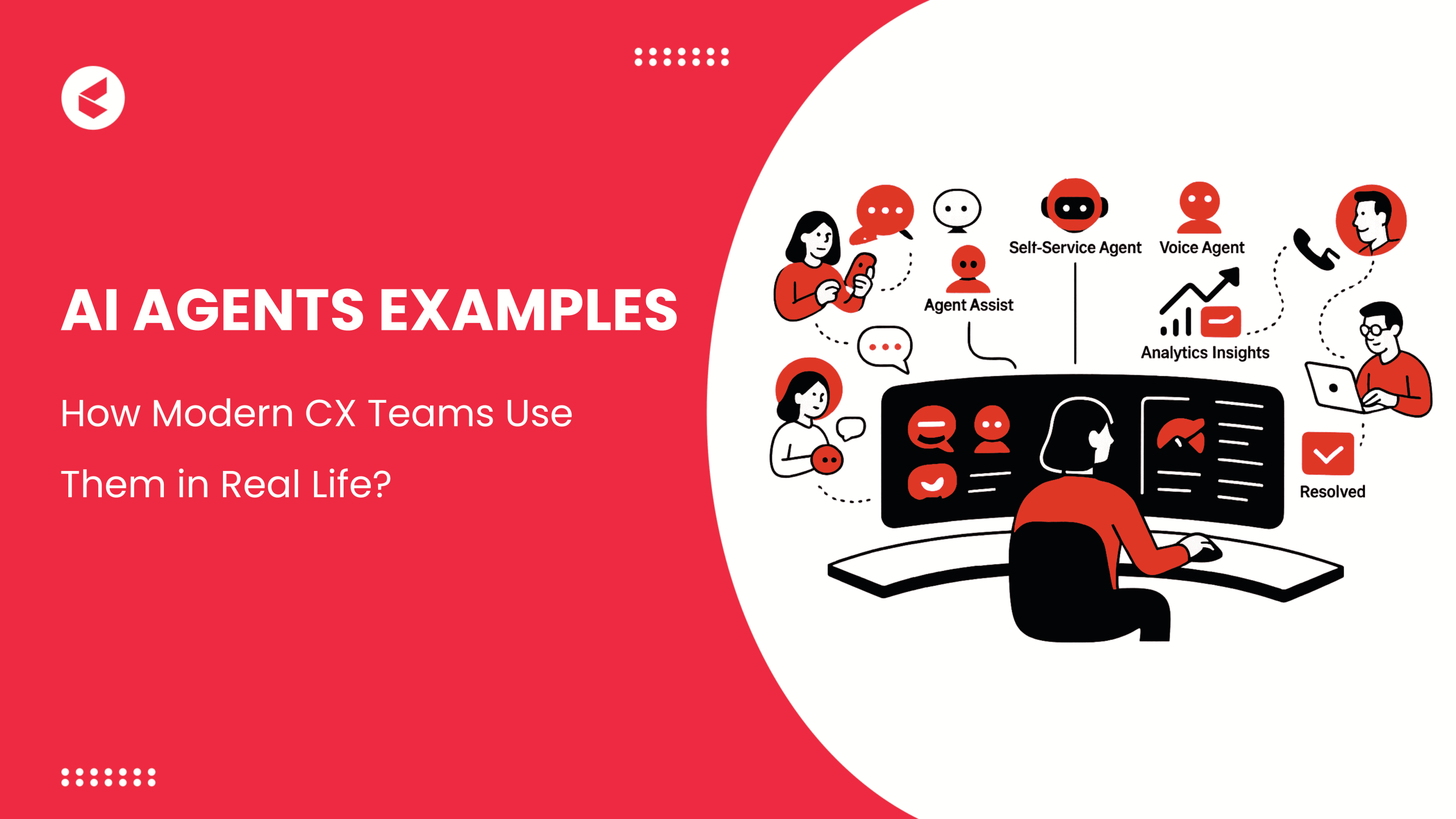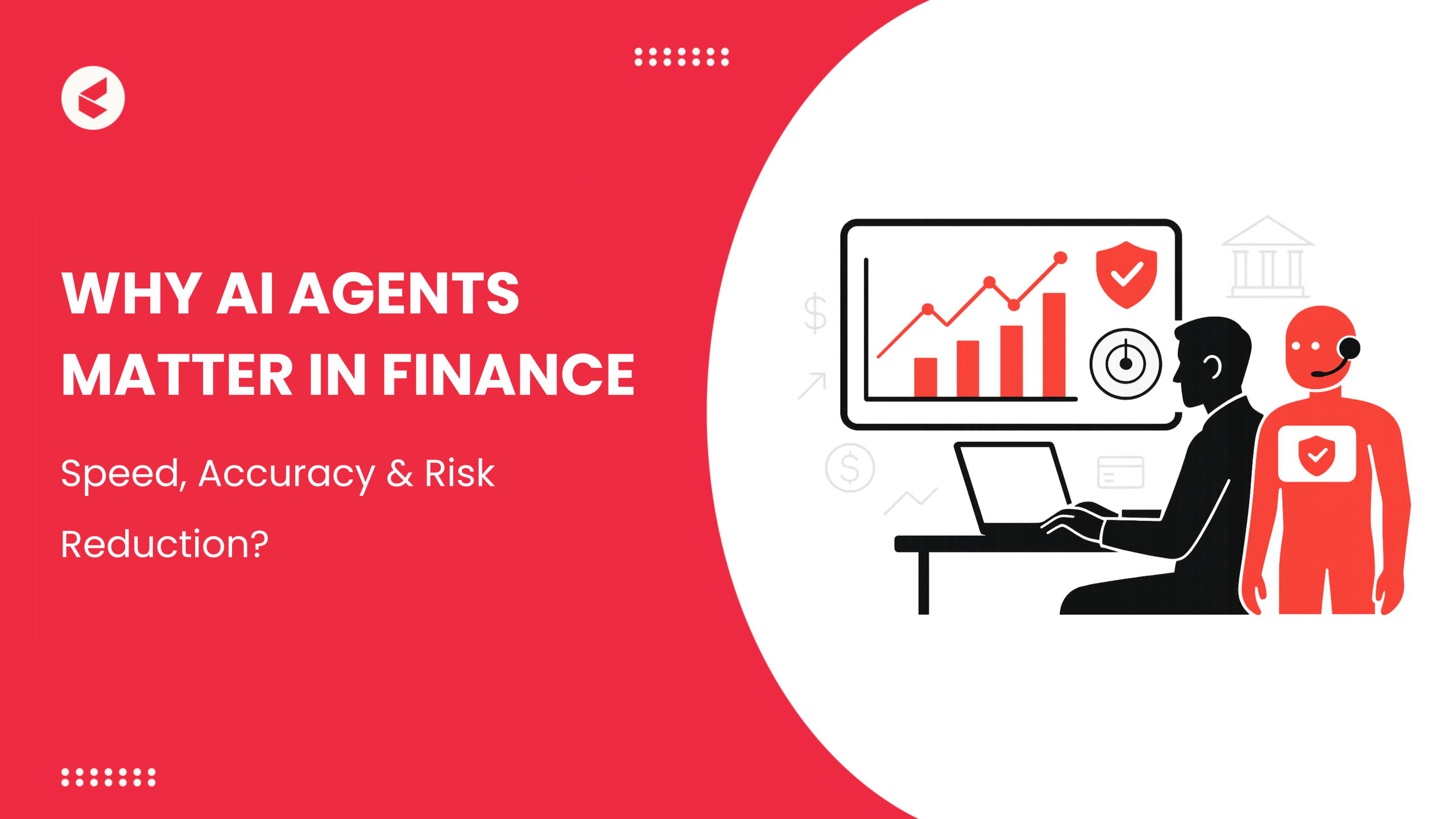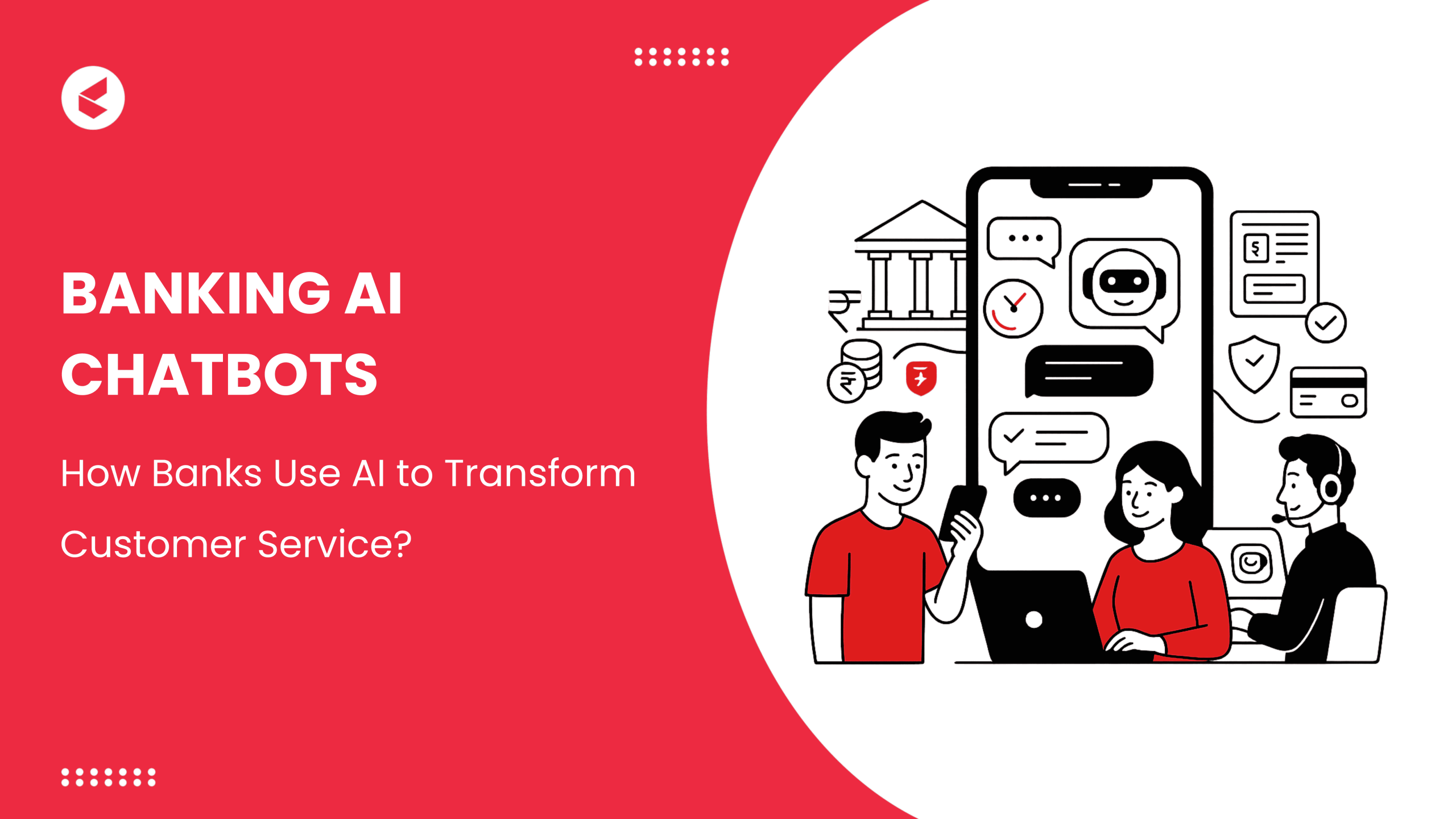“I think it’s very important to have a feedback loop, where you’re constantly thinking about what you’ve done and how you could be doing it better.” – Elon Musk.
To implement an impactful feedback loop, you need an efficient ticketing system. An email ticketing system centralizes all email-based communication, giving you a clear picture of your service quality.
This includes customer complaints, requests for support, feedback, and inquiries. Your service teams can then collaborate internally to assign these inquiries to the relevant agent and deliver quick, efficient resolutions.
Customers browse brands across multiple channels today (like social media, WhatsApp, website, etc.), which makes it essential to centralize customer communications on a single platform. According to McKinsey, 83% of customers across all age groups above 18 still use email to contact customer care. Investing in email ticketing systems helps enterprises streamline their service process, ensuring every ticket gets addressed.
This blog discusses the benefits of email ticketing systems, key features to look for, the 12 leading email-based ticketing systems in 2025, and how to choose the most suitable one.
Benefits of Using an Email Ticketing System
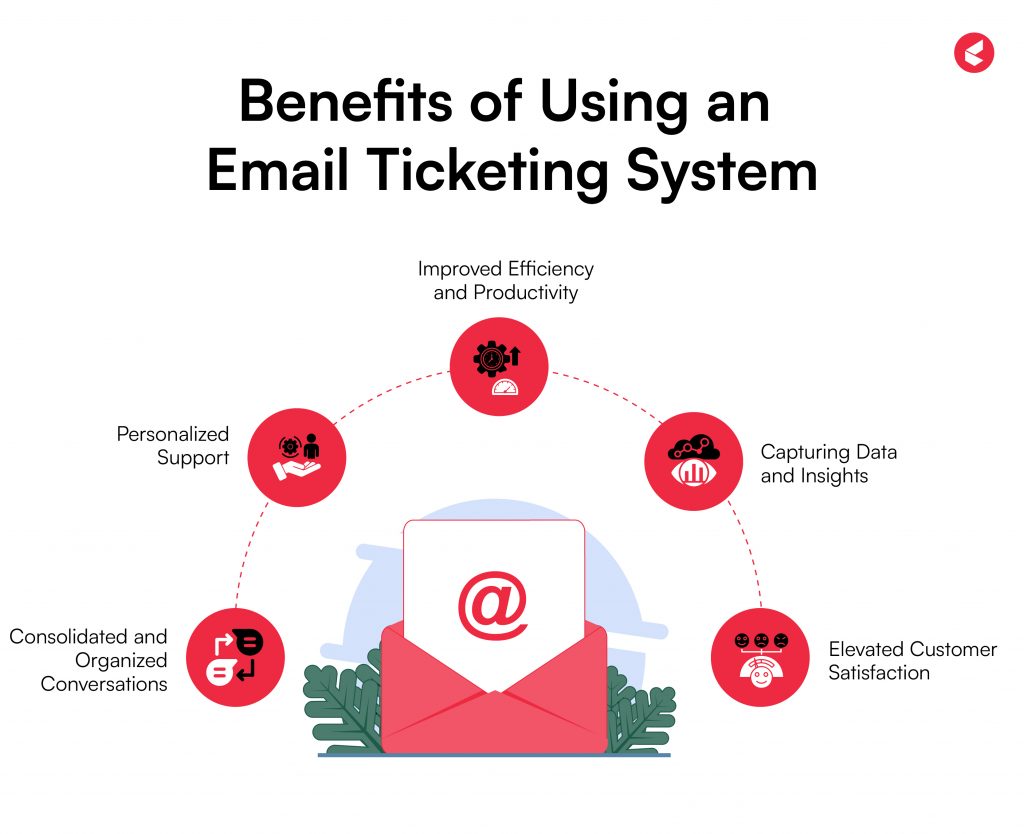
An email ticketing system is a customer support tool that centralizes and converts all email-based customer communications into tickets you can easily track. They help you efficiently manage customer support requests by automatically capturing and logging each email as a unique customer ticket with ID.
Let’s explore in detail how the best email ticketing system offers several advantages to your business:
1. Consolidated and Organized Conversations
It is humanly difficult to individually check the thousands of customer emails your enterprise receives daily. Email ticketing systems help you by logging each customer’s email as a ticket in your internal systems (like a CRM) so that your support agents can easily keep track of what is pending.
These systems consolidate all conversations in one location and organize them neatly according to the labels you specify, preventing emails from being scattered throughout representatives’ mailboxes.
2. Personalized Support
When a single platform is empowered to put customer information, history, and patterns into context, it promises a powerful personalization potential.
Email ticketing systems consolidate customer conversations and collate data on a timeline, creating enriched insights that reveal customer preferences and behaviors. Your representatives can easily leverage this data to create personalized customer experiences.
For example, say that a customer emails a brand about purchasing a limited edition product that is now out of stock. Email ticketing systems can personalize the email by offering unique incentives based on their shopping behaviors, providing them early access, and using their first name to establish cordial terms.
3. Improved Efficiency and Productivity
Email ticketing systems automate repetitive tasks such as ticket creation, assignment, tracking, prioritization, logging, etc. They automatically direct requests to the correct department each time, reducing the administrative burden on the workforce and helping them focus more on critical tasks.
Other features like improved collaboration and integration with the knowledge bases further enhance the workflows.
4. Capturing Data and Insights
Email ticketing systems capture data from tickets, such as response time, type of ticket, frequency of issue, etc., to analyze it for insights. They also derive key performance indicators from the data, such as ticket volume, average handle time, SLA compliance, etc.
These insights strengthen the decision-maker’s ability to adjust strategies, allocate resources, and improve service quality and delivery to improve customer satisfaction.
5. Elevated Customer Satisfaction
Streamlined internal processes generate high-quality outcomes. The same concept applies to managing customer tickets. When customer queries are resolved timely, their satisfaction levels rise.
Key Features to Look for in an Email Ticketing System
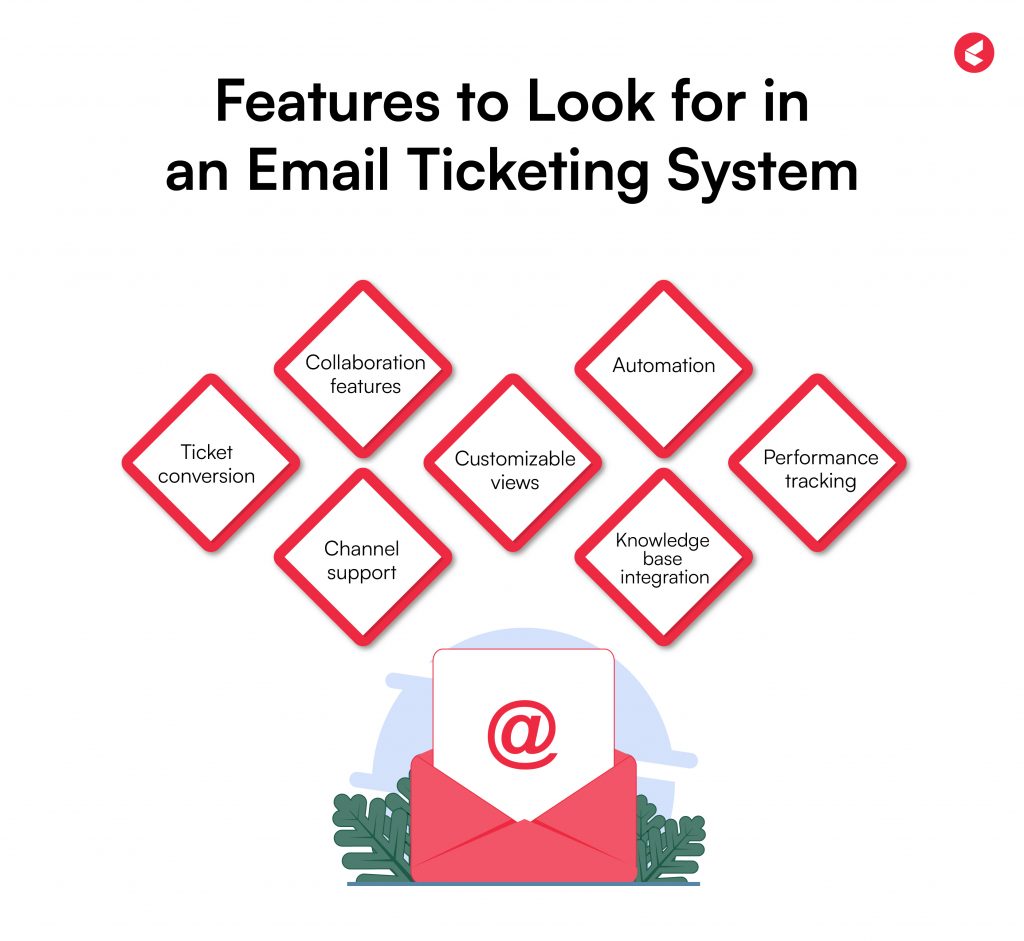
McKinsey highlighted that 87% of Gen-X, 86% of Baby Boomers, 84% of Millennials, and 75% of Gen-Zs prefer email as a customer care channel in 2024. This necessitates careful selection of your email ticketing software. Here are a few must-have features:
1. Ticket conversion
Search for ticketing systems that offer automatic email-to-ticket conversion. This functionality ensures that all customers’ emails are accounted for and that your representatives access a sorted well-organized ticket stack.
2. Collaboration features
Some customer issues require a multifaceted approach through collaboration between two or more departments. It is handy to have collaboration features built into the ticketing system to efficiently tackle such situations.
3. Customizable views
Customizable views help you focus on the most important information for the task at hand. For example, frontline agents only need to see customer tickets and associated details on their dash. Select a platform that offers this capability.
4. Automation
Email ticketing systems with automation for assigning, routing, tagging, labeling, and responding to customer queries reduce the workload on your human agents. It is an excellent way to enhance employee satisfaction for your frontline staff.
5. Performance tracking
To measure the impact of automation and the new tool on your workflows and efficiencies, you need to track KPIs. Choose an email ticketing system that measures customer satisfaction, agent performance, average handle time, and response and resolution times as part of the package. If it tracks more metrics, all the better.
6. Channel support
It is helpful to choose a ticketing system that supports more channels than email. This system consolidates customer queries from all channels (such as social media and instant messaging) into a single window, allowing your representatives to function efficiently.
7. Integration with a knowledge base
To make work easier for customer service representatives, search for an email ticketing system that allows you to create a knowledge base or integrate with one. Consequently, your representatives are able to access the knowledge base directly from the ticketing interface to resolve customer queries.
Top 11 Best Email Ticketing Systems
Here is a carefully curated list of the 11 best email ticketing systems of 2024:
1. Kapture CX
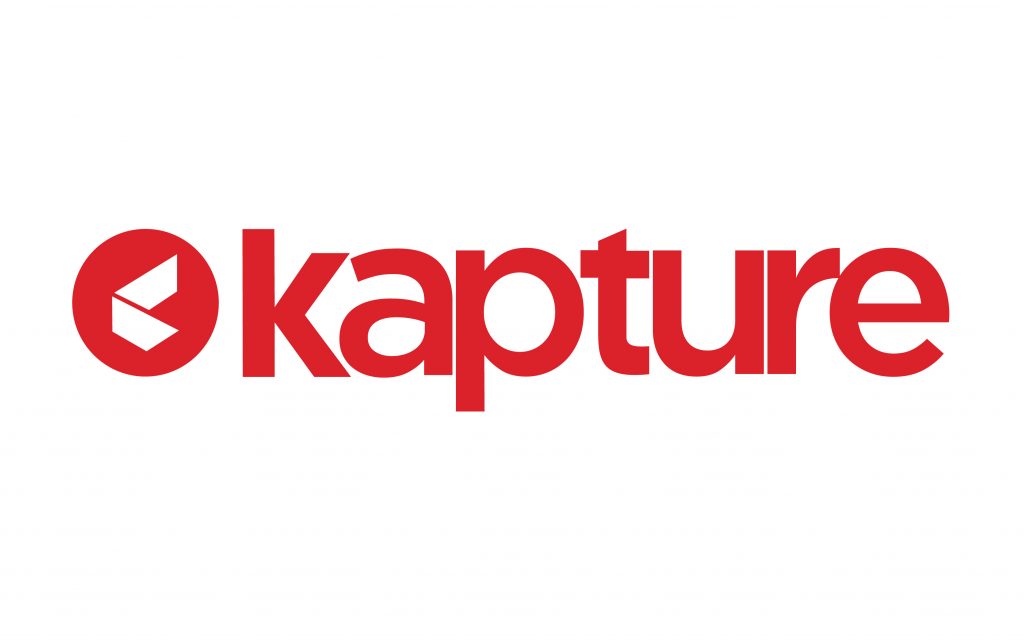
Kapture is an AI-first omnichannel contact center solution that unifies customer conversations in a team inbox.
Advanced automation features, customizable workflows, and insightful analytics in Kapture CX power the support team to prioritize tasks, reduce response times, and enhance customer satisfaction. With its user-friendly interface and integrative functions, it is the perfect tool every company should have in pursuit of its objectives: to provide an outstanding customer experience with precision and professionalism.
Key Features
- Unify customer conversations across all channels, 360-degree customer views, and efficient channel switching for seamless experiences.
- Use AI Agent Assist for quick responses, powerful reports and dashboards, and AI-powered contextual query resolution for emails.
- Kapture has NLP-powered Bots for natural conversations with the KAI Co-pilot for personalizing responses, AI-driven ticket routing, and automated escalations.
- These features include personalized self-service, a knowledge base, a learning management system (LMS), 1000+ integrations, an SLA tracker, customizable dashboards, multilingual chat and translation, and more.
Unique Selling Point (USP)
Kapture CX is an AI-first platform that goes beyond plain-vanilla automation. It uses AI for complex tasks such as assisting agents live in handling a ticket (AI Agent Assist).
Pro and Con
Kapture CX has an intuitive, user-friendly interface and is a feature-rich platform.
However, customers sometimes experience integration issues with the system.
2. Help Scout
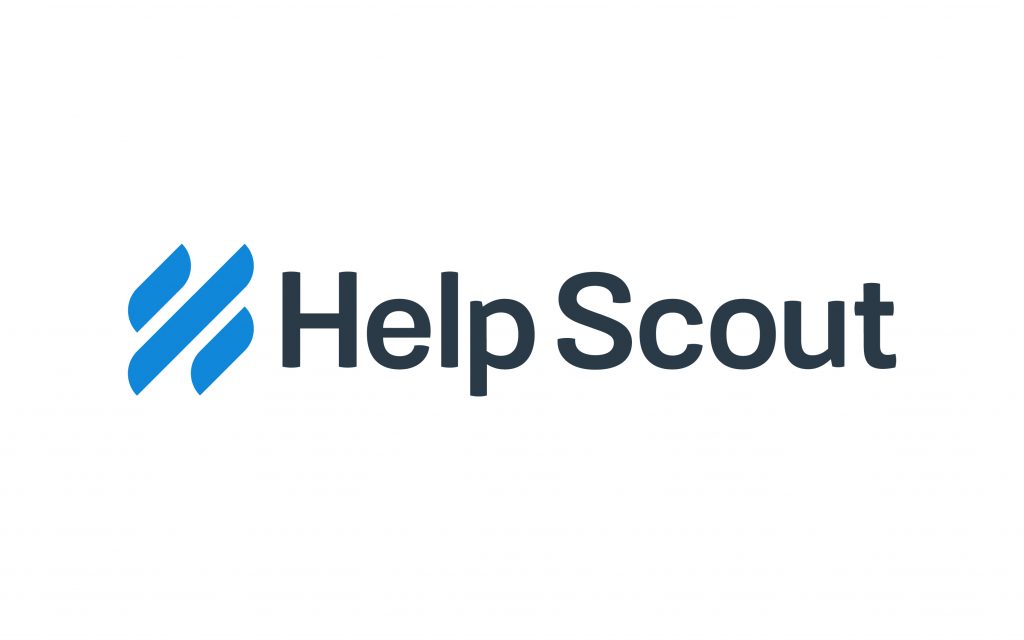
Help Scout is a customer support platform to keep your team aligned and synchronized with a single source of truth.
The platform marries the features of automated responses, tagging, and performance reporting—all in a human-centered way that makes every customer interaction meaningful and personal.
Key Features
- There are options for shared and single inboxes for multiple channels coupled with AI summarization and integration with popular apps like Salesforce.
- Automate email ticket assignments, follow-ups, and routine ticketing tasks.
- Send automated emails in response to incoming queries to keep customers informed and engaged.
Unique Selling Point (USP)
Help Scout helps you respond to 56% more customer messages in the first year and raise the CSAT score by 25%.
Pro and Con
Agents can use internal notes and @mentions to keep their teams in the loop.
However, user reviews highlight that the platform has bugs that negatively impact the user experience.
3. Zoho Desk
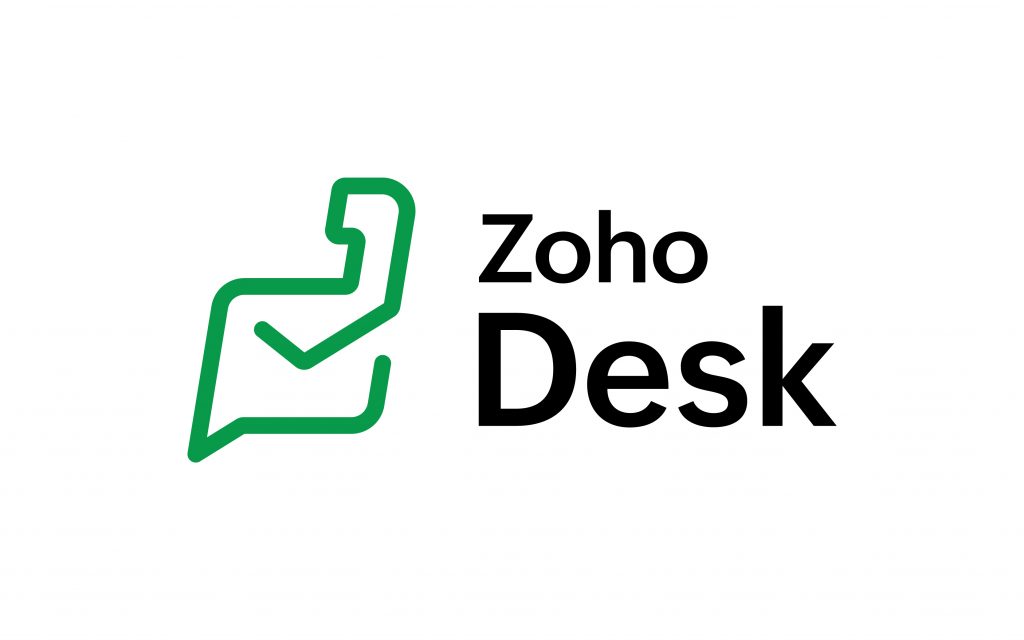
Zoho Desk is a customer service solution that delivers quick issue resolution and helps you boost customer retention.
Its features, such as automated workflows, ticket prioritization, and response templates, help teams handle queries efficiently and quickly.
Key Features
- Collect customer communications from diverse channels (email, chat, social media, etc.) for streamlined management.
- Create personalized email ticket views to focus on specific types of tickets based on priority levels.
- Offers predefined response templates you can quickly insert into emails for prompt responses.
Unique Selling Point (USP)
Zoho Desk features a ‘Happiness Rating’, which allows customers to rate a service in two simple options: Good or Bad. This provides immediate clarity on CSAT levels.
Pro and Con
Agents like the customized email organization and automated alerts for new ticket activity.
Yet, reviews indicate that users consider the interface overloaded with features and difficult to use.
4. Shared Inbox by Canary
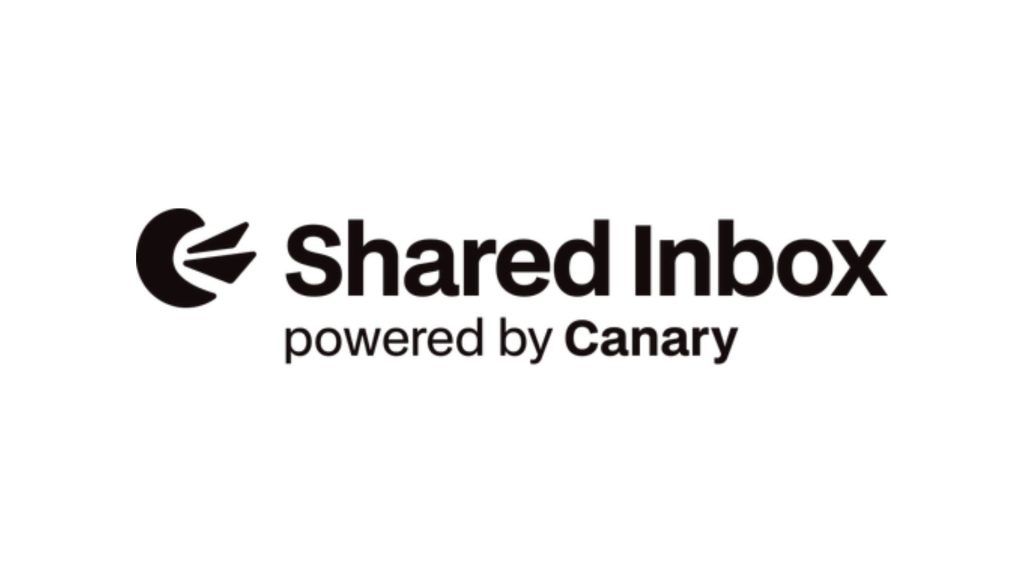
Shared Inbox by Canary is a modern email management and support solution built for teams that want to stay productive and collaborate seamlessly. It simplifies customer communication by keeping everything organized in one place—so your team never misses a message.
The platform combines AI-powered features, streamlined workflows, and collaboration tools that help agents resolve queries faster while keeping communication transparent.
Key Features
- Manage both shared and individual inboxes with role-based access and permissions.
- Assign, track, and update ticket statuses to keep workflows organized.
- Use AI-suggested replies and smart triaging to speed up response times.
- Built-in collaboration with internal notes and real-time updates for smooth teamwork.
- Analytics dashboard to track agent performance, customer issues, and AI deflection rates.
Unique Selling Point (USP)
Unlike traditional helpdesks, Shared Inbox by Canary merges the familiarity of email with AI-powered support features—allowing teams to deliver faster, more personal responses without needing heavy integrations.
Pros and Cons
Teams appreciate its clean, intuitive interface and lightweight setup compared to complex helpdesk software.
However, as a relatively new solution, it currently focuses mainly on email and lacks broader multi-channel support like live chat or social integrations.
5. Zendesk
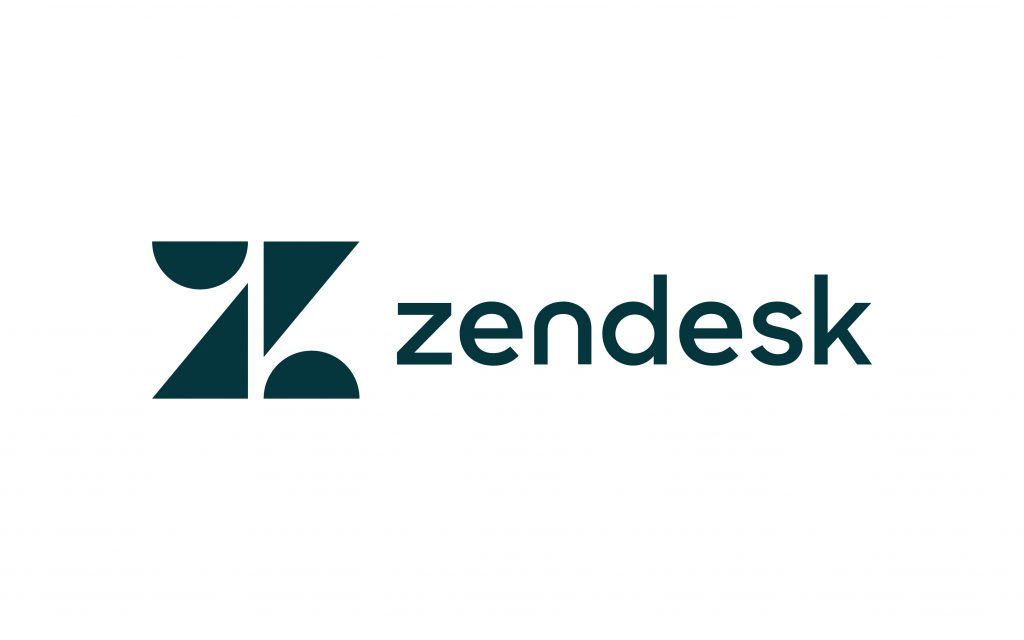
Zendesk is a customer support platform designed for agents. It leverages AI to augment agent workflows and support them in delivering exceptional service.
The platform has an instinctive interface and powerful automation through which one can put support teams in a better position to handle queries while delivering personalized customer experiences.
Key Features
- The platform maintains a detailed audit trail of all email ticket activities for better trackability.
- Create multiple SLAs within the same system to manage response times for different priority levels.
- Create custom email ticket fields based on specific conditions to ensure that relevant information is captured.
Unique Selling Point (USP)
Both small teams and large organizations can use Zendesk to scale because it combines an intuitive user experience with enterprise-grade features.
Pro and Con
Zendesk offers over 1,000 prebuilt apps and integrations through the Zendesk Marketplace.
However, the analytics and reporting are relatively restrictive for the lower-tier packages.
6. HubSpot Service Hub
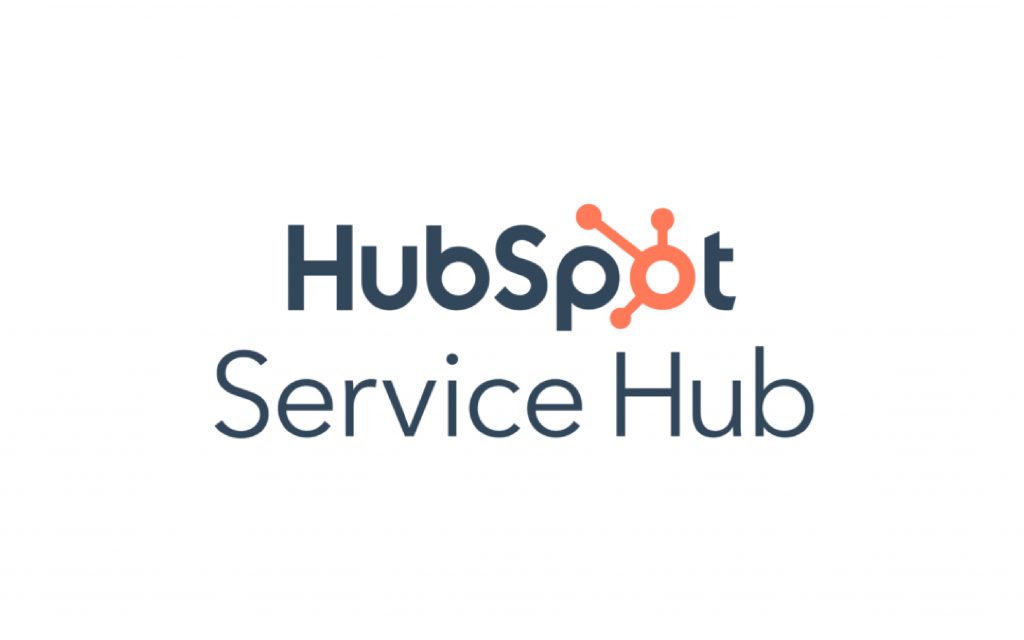
HubSpot Service Hub is an all-in-one customer support platform that efficiently converts customer emails into trackable tickets, centralizing all support efforts.
Automated workflows, reporting, and self-service options make Service Hub the perfect tool for growing your support function at scale while maintaining the quality of the service.
Key Features
- Use predefined email ticket rules to route and assign tickets automatically.
- Add tags and notes to tickets for better categorization, follow-up, and context.
- View comprehensive customer profiles based on previous interactions and tickets on all channels including emails.
Unique Selling Point (USP)
HubSpot Service Hub centralizes everything from customer inquiries to ticket tracking and from automating processes to workflows. Plus, Service Hub is deeply integrated with all of HubSpot’s other tools.
Pro and Con
The platform provides deep insights into your customers with AI-powered analysis.
On the flip side, it doesn’t offer as much functionality around ticketing for businesses looking to get more advanced as, say, a dedicated help desk software would.
7. Salesforce Service Cloud
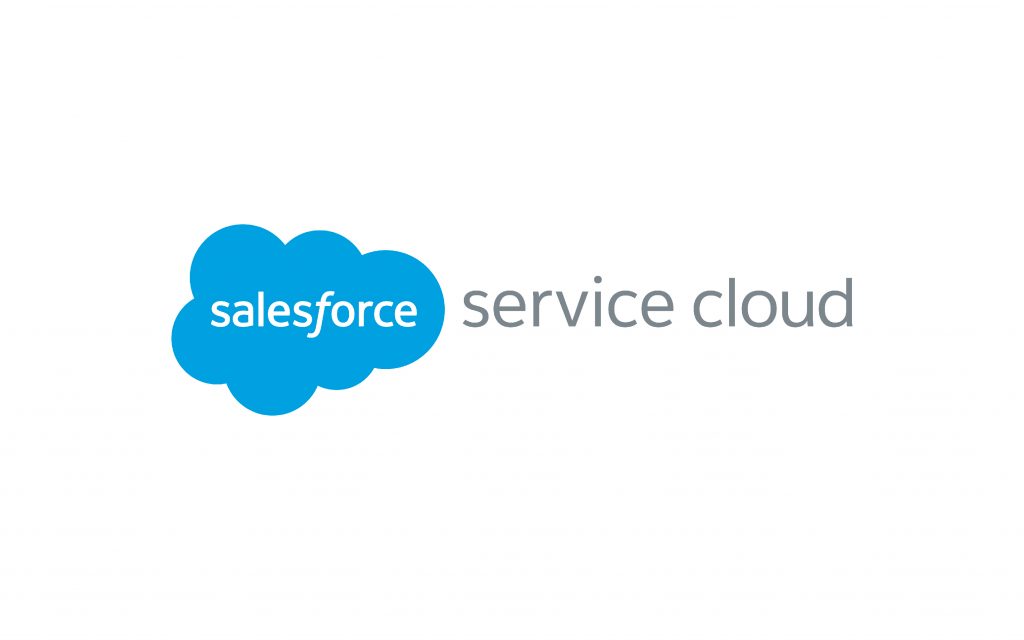
Salesforce is the leading customer service platform for email-based ticketing systems, providing tools and means that help you integrate everything ‘customer’.
Turning customer emails into action items called cases for faster solutions, Salesforce Service Cloud is quipped with AI-driven insights, automation, and omnichannel support.
Key Features
- Automatically attach emails and responses to related cases to maintain complete records.
- Thread related emails together to maintain context for better service.
- Assign default priority and queue to incoming cases to manage workdlows effectively.
Unique Selling Point (USP)
Salesforce Service Cloud is a cloud-based solution that drastically enhances the accessibility of your customer-centric operations, providing unrivaled customer insight to drive personalized service delivery.
Pro and Con
Customer service agents like the AI-generated recommendations for the next steps derived from your data.
However, any advanced customization requires knowledge of APEX coding, which complicates things.
8. Hiver
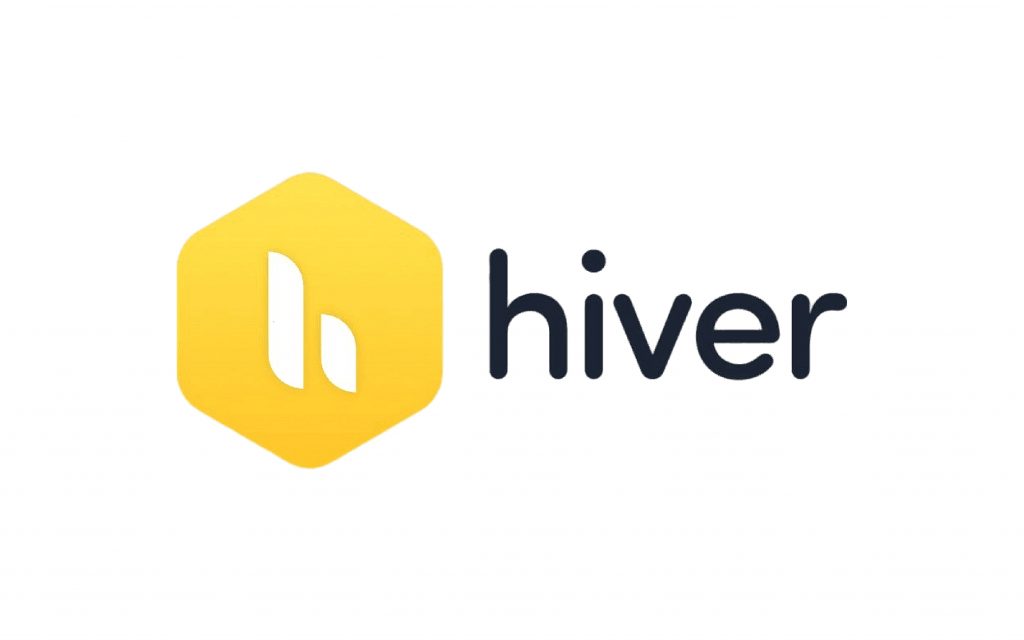
Hiver converts Gmail into an effective email ticketing system, arming customer support teams to manage queries right from the comfort of their inbox.
Since Hiver works within Gmail, it automatically negates the need for training to understand any new software, one of the biggest bottlenecks in efficient support operations and effective team collaboration.
Key Features
- Manage group email accounts like support@ or sales@ directly from Gmail, with clear ownership and accountability for each email.
- Integrate feedback surveys to gather customer satisfaction data directly from email tickets.
- Generate detailed reports and analytics on email ticket volume, response time, and resolution rates.
Unique Selling Point (USP)
Hiver’s main USP is evidently its use of Google Workspace to create a unified email-based ticketing system that eliminates the need for an external system.
Pro and Con
Agents like the shared inbox that enables them to keep track of assignments.
A con would be that Hiver only allows users to manage customer conversations in Gmail without third-party integrations, which is restricting.
9. Freshdesk
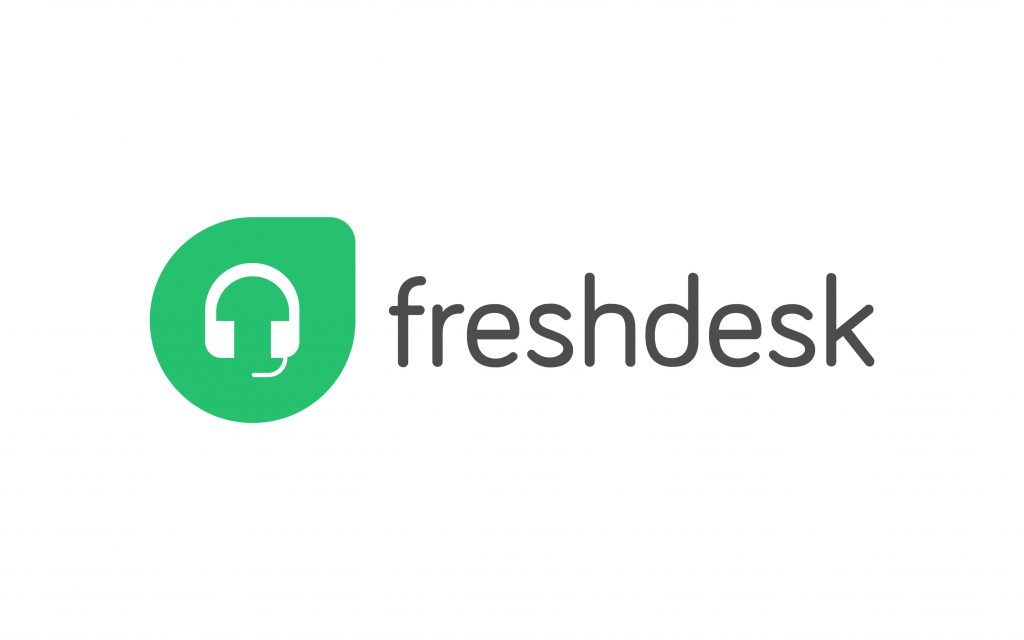
Freshdesk is an advanced customer service solution with powerful automation and AI built in, which can be used for advanced ticketing workflows.
This platform’s intuitive interface and scalability make it ideal for businesses aiming to optimize support processes while improving customer satisfaction.
Key Features
- Populate case fields automatically in incoming emails to reduce manual data entry.
- Support agents are able to work together on email tickets using shared ownership, private notes, and collision detection to avoid duplicate efforts.
- Integrate email with chat, phone, and social media, providing a seamless customer experience across multiple channels.
Unique Selling Point (USP)
Freshdesk offers one of the market’s most comprehensive feature sets with smart features such as a ‘Thank you!’ detector that enhances productivity.
Pro and Con
Freshdesk connects conversations with powerful AI features and team collaboration capabilities.
Yet, some advanced features, like custom reporting and analytics, are only available in higher-tier plans.
10. Jira Service Management
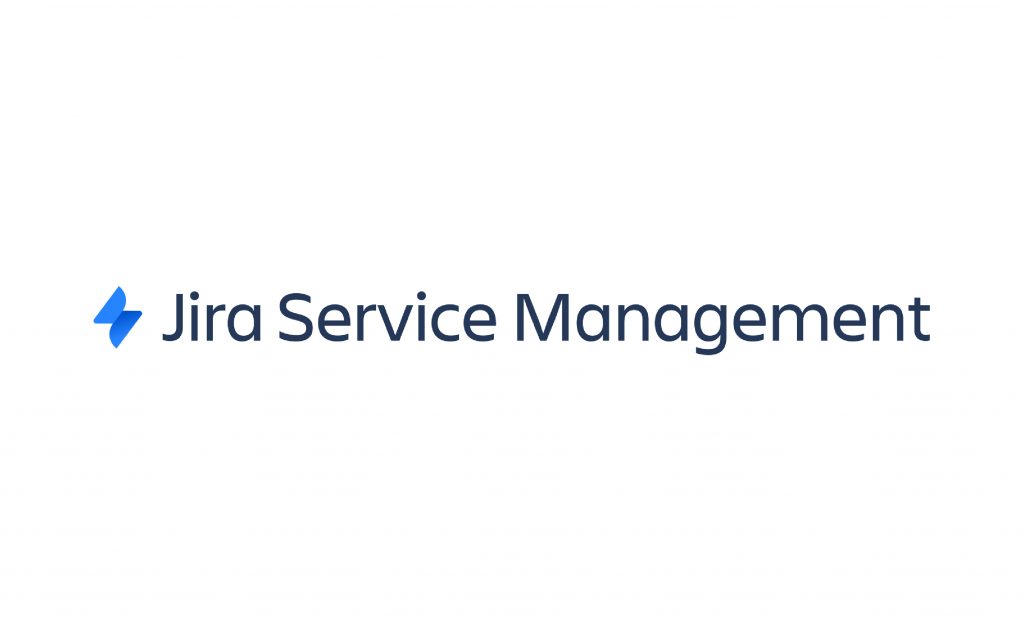
Jira Service Management is an Atlassian product with a service focus on developers, IT, and business teams.
This tool provides a full-featured, email-driven ticketing solution that transforms incoming emails into trackable issues, integrates them with development tools, and offers strong automation in dealing with complex requests.
Key Features
- Convert customer emails into Jira issues to streamline ticket creation.
- Configure email handlers to control how you process emails and issue creation.
- Automate ticket assignments, escalations, and notifications using no-code and low-code configurations, saving time and reducing manual effort.
Unique Selling Point (USP)
Jira Service Management is a unique solution developed specifically for the IT services niche.
Pro and Con
Customers like Jira’s smooth interface, allowing them to quickly find what they need.
On the other hand, customizations and workflow setups are more time-consuming than they should be, especially for non-IT teams and businesses.
11. Dixa
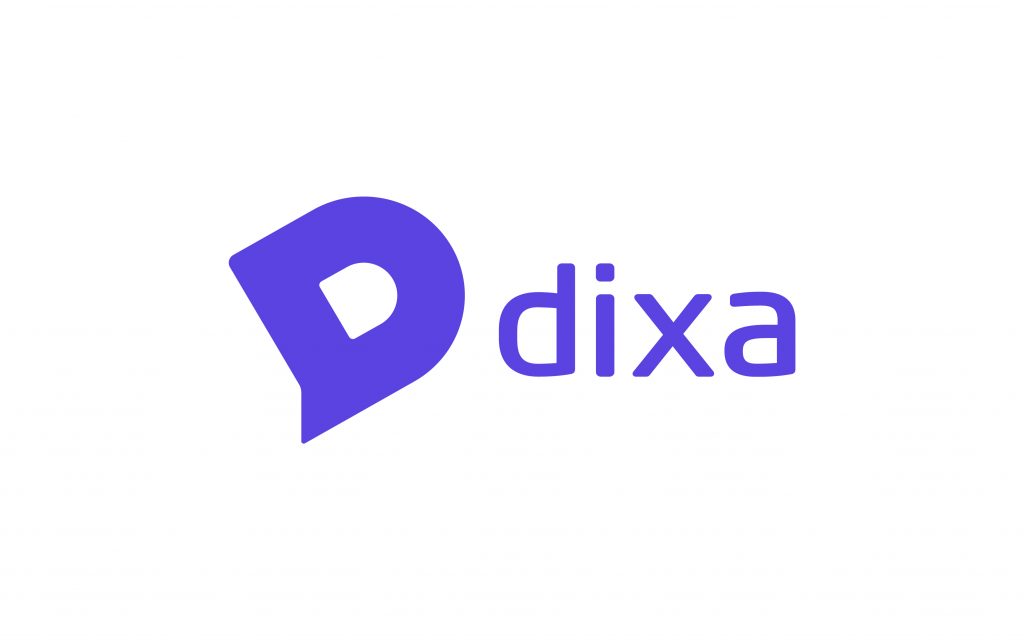
Dixa is an intuitive email ticketing system built to support B2C companies by turning messages into palatable conversations. It all comes together in a single view, where agents can provide personalized and efficient service.
From intelligent automation to real-time collaboration, Dixa simplifies managing support workflows of any size.
Key Features
- The AI-powered Dixa Conversation Engine intelligently prioritizes, routes, and categorizes incoming emails based on customer intent and urgency to improve response time.
- Consolidate customer email into a single inbox for better collaboration.
- Recognize customers based on email addresses to personalize support.
Unique Selling Point (USP)
Designed for companies directly dealing with customers, Dixa allows agents to see tickets by action day instead of only created or solved status, a feature not available with other popular systems.
Pro and Con
Dixa shows settings, conversations, analytics, a dashboard, and everything else in one place, which users like.
However, there are limited customization options for complex workflows compared to more enterprise-focused tools.
12. Jitbit
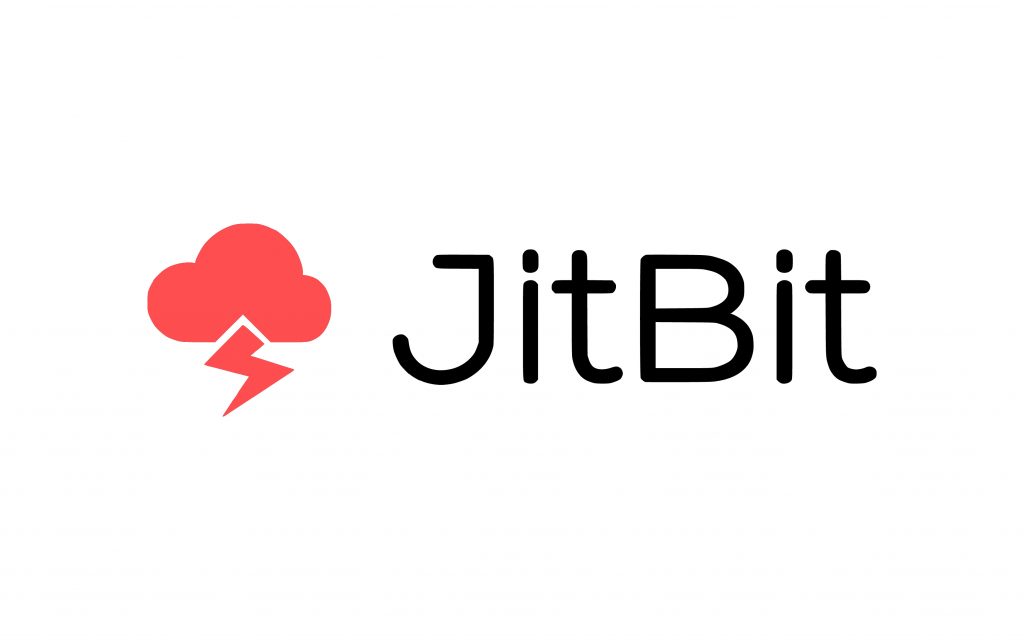
Jitbit is a lightweight, efficient email ticketing system specializing in IT and SaaS industries. As an email-first ticketing system, it empowers users with unique features targeted at emails, such as email processing and server configurations.
Apart from dedicated tools for email and live chat support, it also offers primary support and query management features.
Key Features
- Automatically route emails to specific ticket categories depending on email address.
- Display who handles which tickets in real-time for better visibility.
- Manage tickets with the email API by adding special commands in the subject line.
Unique Selling Point (USP)
User-friendly interfaces, fast setups, powerful automation, and ease on small to medium-sized teams make Jitbit ideal.
Pro and Con
Customers like Jitbit’s analytics capabilities and its ticket system customizations.
Yet, it has limited advanced features that might not suit complex workflows.
Comparison Table: Best Email Ticketing Systems
| System Name | Key Features | Best For |
| Kapture CX | Omnichannel, AI for agents, smart automation, full contact center, and more. | Large and small enterprises seeking to improve CX. |
| Help Scout | Shared inbox, email productivity, proactive messaging, no-code builder. | Small to mid-sized businesses seeking to prioritize complete customer support. |
| Zoho Desk | Guided conversations, strict SLA management, inbuilt analytics, workflow builder. | Small businesses to large enterprises. |
| Shared Inbox by Canary | AI-powered shared inbox, collaborative ticket management, email-to-ticket conversion, analytics dashboard. | Teams seeking a modern, AI-driven email ticketing solution with simplicity and speed. |
| Zendesk | AI-backed omnichannel support, complex customer support workflows, and unique reporting and analytics features. | Rapidly scaling businesses that require AI and customized solutions. |
| HubSpot Service Hub | Merge with HubSpot CRM, create custom ticketing pipelines, and self-support systems. | Companies already using HubSpot products. |
| Salesforce Service Cloud | Einstein AI, integration with Salesforce CRM, and multi-channel support. | Companies already using Salesforce products. |
| Hiver | Shared inbox management, tag tickets for collaboration, and automated workflows. | Teams that use Google Workspace. |
| Freshdesk | Unified agent workspace, advanced ticketing and SLA management, and team collaboration. | Teams seeking to implement self-service. |
| Jira Service Management | IT-dedicated cross-departmental collaborations, incident management, and incorporation with ITSMs. | Engineering/IT teams using Jira products. |
| Dixa | Real-time information, AI-driven Dixa Conversation Engine, and comprehensive Agent Hub. | For B2C and D2C teams looking to apply efficient ticketing systems. |
| Jitbit | Email-first ticketing system, free mobile apps, and automated replies. | Organizations with self-hosting for emails. |
How to Choose the Right Email Ticketing System for Your Business?
Selecting the right tool can be a game-changer for your enterprise. According to PwC, 54% of customers in the US admit that customer experience at most companies needs to improve.
With that in mind, here is how you can select an email ticketing system that makes a difference:
1 . Friendly UI
The tool should be easy to use. Consider your support agents’ needs and skill levels and select a tool that fits their requirements. Look for intuitive design, speed and efficiency in use, accessibility options, feature shortcuts, customizable dashboards, and AI integration for quick access or responses.
2. Easy integration
Your ticketing system must be able to exchange data with your CRM or other databases freely. Check for inbuilt APIs, integration modules, plugins, connectors, or third-party compatibility that allow you to integrate the system easily with your workflows.
3. Scalability
To avoid changing or upgrading your ticketing system a few years later, look for scalable software that can be easily reconfigured. Assess its volume handling, user capacity, and expansion features to align them with your business goals for, say, the next five years.
4. SLA management
Service Level Agreements (SLAs) are critical to help you set service benchmarks and goals at your organization. However, they are not static. Look for software that allows you to customize SLA rules as required. Selecting a system that offers automated ticket prioritization based on dynamic SLAs is even better.
5. Cost and ROI
Besides setting aside a budget for a good ticketing system, consider the total cost of ownership. Consider the subscription fees, upgrade charges, maintenance costs, etc., and weigh them against the potential ROI you can expect from the solution.
6. Security and compliance
Customers share private data over email and other channels to access relevant services. Search for systems incorporating multi-level security, such as end-to-end encryption, multifactor authentication, access governance, and rotating password policies.
Streamline Email Ticketing Effortlessly
According to PwC, consumers consider bad agent attitudes (about 65%) and unfriendly service (about 60%) the leading factors in customer churn. Thus, it is necessary to design a foolproof customer service strategy that accounts for all the communication gaps within your company.
Consider implementing an email ticketing system as the starting point for your journey to exemplary customer experiences. Partner with Kapture CX to deliver hyper-personalized customer experiences at scale.
Kapture offers industry-oriented email ticketing and help desk solutions for BFSI, Travel, Consumer Durables, and more. We can help you boost your first-call resolution and CSAT by up to 30% and reduce average handling time by up to 28%.
To explore more capabilities of the Kapture CX platform, visit the website.
Frequently Asked Questions About Email Ticketing Systems
When a customer sends an email inquiry, the ticketing system automatically converts the email into a ticket, including all the relevant details such as name, email ID, subject, content, etc. It then labels and assigns the ticket to a suitable agent according to predefined rules.
Yes, email ticketing systems are designed to handle high-volume queries. They follow predetermined rules to prioritize tickets, send automated responses, and assign inquiries to relevant agents in moments.
Yes, it is possible to integrate generative AI into email ticketing systems. You can use this capability to automatically generate quick and context-aware responses to basic customer queries. You can also use GenAI to send automated response emails to customers who connect with you first.
Yes, you can easily scale email ticketing systems up or down based on your call volume and agent load. These systems provide consistent service across all channels for small businesses without employing much human resources.
